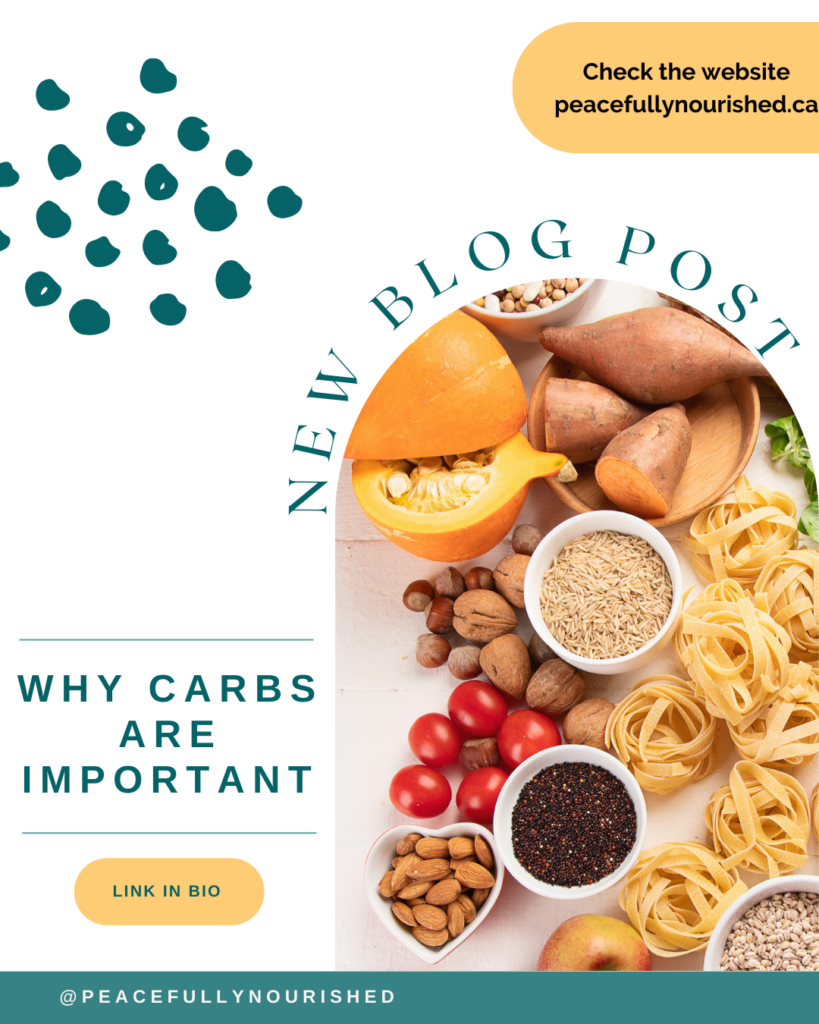Are carbs really the enemy? We are no stranger to the dark cloud diet culture puts around carbs, but do they deserve it? Today we will be discussing what they are, where they are found, and the important role they play in a healthy diet.

What are Carbs?
First, what even are carbs? At the biological level, carbohydrates are molecules made up of a ratio of carbon, hydrogen, and oxygen atoms. These molecules, called carbohydrates or carbs, are sugar molecules. Carbs are one of the 3 main macronutrients found in foods – protein, carbohydrate, and fat – that help provide the body with energy. No, not just the energy keeping you awake throughout the day, but those that keep your body moving, your brain active, and your heart beating among many other functions.
What Foods Contain Carbs?
When you think of no-carb or low carb diets, many people think of meals consisting of meats and vegetables. But did you know that vegetables themselves are carbs too? Let’s clear up some of the confusion. Here is a list of just some of the food sources of carbohydrates.
- Whole grain foods
- Vegetables
- Fruits
- Legumes
- Nuts and seeds
- White bread
- Dairy products
- Baked goods
- Juices and soft drinks
Now that’s a lot of foods! But, are they all the same or is there a difference between food sources of carbs? Well, that brings us to our next point.
The Different Types of Carbs
There are 2 main types of carbohydrates— “simple carbohydrates” and “complex” carbohydrates, and many have a mix of both. Don’t worry though, we won’t make them too “complex” for you. See what we did there?
Simple carbohydrates, also known as refined carbs, get a bad wrap. They are sugars that have a basic chemical structure and are more rapidly digested than their complex counterparts. This rapid release of glucose causes a quicker and higher spike in blood sugar. Simple carbs are naturally found in fruits, vegetables, and dairy products, but can also be found in the refined sugars added to processed foods. Simple carbs can include refined foods that have had their fibre, bran, and nutrients altered or removed. Examples of simple carbs other than vegetables, fruits, fruit juices, and dairy are table sugar, syrups, candy, sugary drinks, and products with added sugars or refined grains like white bread, flour, rice, pasta, and many desserts and cereals.
Complex carbohydrates contain longer, more complex chemical structures making them take longer to be digested by the body, and in turn, provide more long-lasting energy. The two types of complex carbs are fibre and starch, which help steady the release of glucose into the blood stream. Examples of complex carbs include whole grains (oats, quinoa, wheat, corn, brown rice, etc), nuts, seeds, legumes, and fruits and vegetables.
Yes- you read that right- fruits and vegetables can be both simple and complex carbohydrates! Fruit, for example, has naturally occurring sugars in the simple carb fructose, and dietary fibre, a complex carb.

Why are Carbs Important?
In general, carbohydrates help power our brain and body. As we have discussed, carbohydrates are one of the 3 macronutrients that our bodies use for energy and are the preferred source of energy for our bodies and brain over fat and protein. Carbs in the food we eat are broken down by the body into a type of sugar called glucose. This glucose then helps provide energy to our body’s organs, cells, and tissues. Carbohydrates help by providing energy, energy storage in the body, preserving muscle, and assisting with digestive health.
You may be wondering- if carbs are so important, how are low-carb and no-carb diets possible? Great question! Technically, the body does not need to consume carbohydrates to survive. But your body does not like to do this. If necessary, the body can make energy from proteins and fats, however, carbs are the preferred source of energy. Another dedicated blog post coming on this I promise!
The Moral of this Carb Story
To summarize, carbohydrates are an important part of a healthy diet. They assist the body with many important functions like providing energy and energy storage, preserving muscle, and digestive health. Some examples of carbs include fruits, legumes, whole grains and vegetables, to white sugar, white bread, candy, and pastas. Just like food rules in general that have told you of “bad” and “good” foods, there are no carbohydrate that is “worse” than the other. Sure, complex carbohydrates can be prioritized for their slow release of sugar into the bloodstream, but all carbohydrates fit in moderation!
Did you learn anything new about carbohydrates today? Let us know in the comments below!

leave a comment
share
share
share
share
share